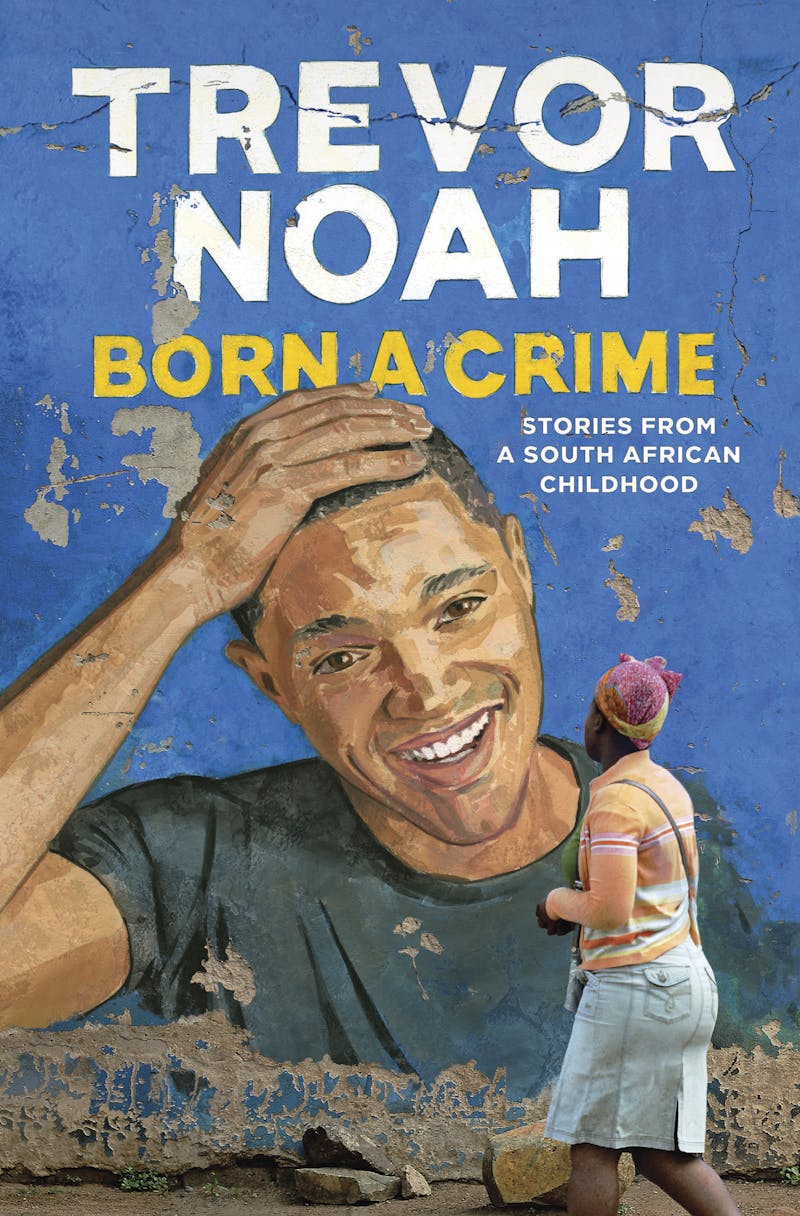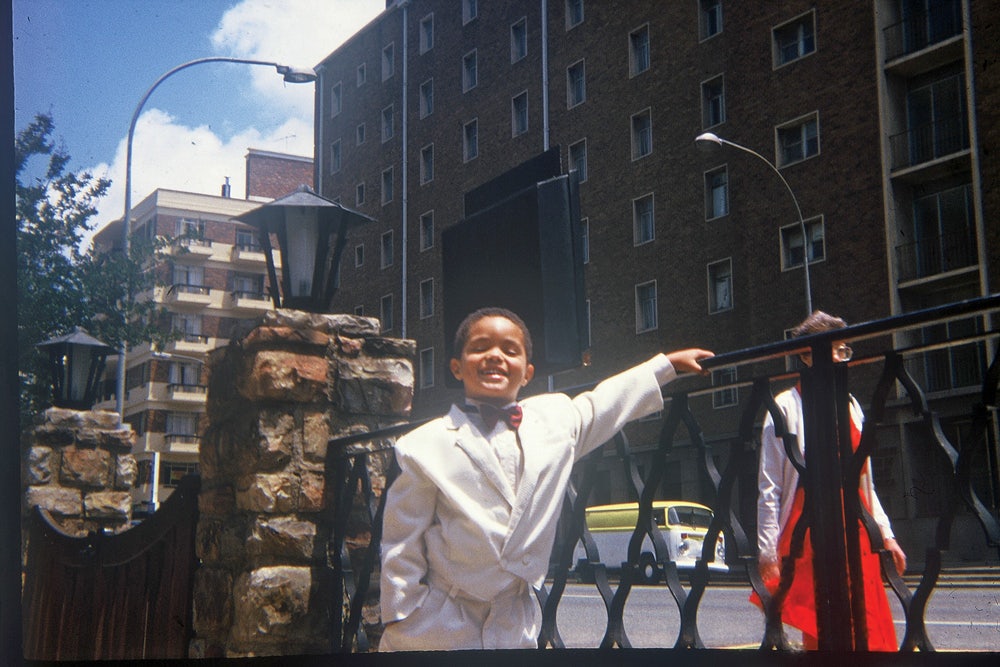Patricia Nombuyiselo Noah’s decision to give birth “was a crazy, reckless” one, her son, the South African comedian Trevor Noah, writes in his memoir, Born a Crime. For much of his childhood, Noah’s parents—a Xhosa mother and a Swiss-German father—could not be seen together; Patricia could not even interact with her son in public. “During apartheid,” Noah writes, “one of the worst crimes you could commit was having sexual relations with a person of another race.” The penalty was five years in prison. “Where most children are proof of their parents’ love,” he explains, “I was the proof of their criminality.”
Yet while it was illegal to be “mixed” (to have a black parent and a white parent), it was not illegal to be what South Africans call “colored” (to have two mixed parents). Patricia enrolled her son in a colored school and enlisted the help of a colored neighbor to transport him. The neighbor would “walk next to me and act like she was my mother,” Noah recounts, “and my mother would walk a few steps behind, like she was the maid working for the colored woman. I’ve got dozens of pictures of me walking with this woman who looks like me but who isn’t my mother. And the black woman standing behind us who looks like she’s photo-bombing the picture, that’s my mom.”

Noah’s experience of state-sanctioned racism—of its brutality and absurdity—gives his book unusual resonance today. Appointed host of the Daily Show last year, Noah has come to prominence at a time when questions of racial identity transfix the nation to a degree not seen since the 1960s. His good looks, racial fluidity, and vague internationalism—qualities shared by other prominent “biracial” public figures, from Drake to President Obama—help render him appealing to multiple, overlapping American audiences. He embodies an inherent “wokeness” consistent with the left-of-center politics now so closely aligned with late-night comedy. And while he can claim the identity-based epistemology the left increasingly covets, he never presents as so black or aggrieved as to feel unpalatable.
In Born a Crime, Noah recounts his odd and precarious journey from extreme poverty and oppression in South Africa to the brink of his professional breakthrough. Throughout, his ability to move between starkly different social worlds—and to find humor in society’s double standards—proves the result of this initial, drastic inability to fit in anywhere. With the platform he’s built, he has a real chance to influence the way millions of young people think and speak about race, a reconsideration his gripping biography seems to demand.
Noah’s story begins with a portrait of his remarkable, almost inexplicable mother, a woman striving to live outside her era’s airtight constraints of race and class. At age nine, Patricia embarked on a quixotic mission of self-determination as admirable as it was dangerous: She asked her mother to send her to live with her charming, womanizing father. But instead of taking her in, her father sent her to live with his sister. For the next twelve years, Patricia lived in a hut with 14 cousins, tilling the “depleted and eroding” farmland allotted to black farmers. Food was scarce. “There were times when she literally ate dirt,” Noah writes. She would mix clay from a riverbank with water “to make a grayish kind of milk. She’d drink that to feel full.”
It was Patricia’s good fortune to attend a village school taught by missionaries, giving her an English-language education and a means of escape. At 21, she enrolled in a secretarial course and before long she ran away to Johannesburg—a city blacks could enter to work, but were required to leave before the nightly curfew. Patricia slept in public restrooms and learned, from Xhosa prostitutes she met, how to navigate the shadows. “They taught her how to dress up in a pair of maid’s coveralls to move around the city without being questioned,” Noah writes. They also introduced her to foreign white men who were willing to rent out flats illegally. She moved to a bohemian neighborhood called Hillbrow, and befriended a blond man named Robert, who lived down the hall from her. The man would become Noah’s father, though his parents never even tried to be a couple.
Born in 1984, Noah spent some of his early years in his grandmother’s cramped home in Soweto, where he was the only light-skinned person in sight—and, often, got away with murder. When he misbehaved, his grandmother balked at hitting him—even though she beat the living daylights out of his dark-skinned cousins for lesser infractions. (“I don’t know how to hit a white child,” she explained.) His grandfather addressed Trevor as “Mastah,” and insisted on driving him in the backseat, like a chauffeur. “There were so many perks to being ‘white’ in a black family, I can’t even front,” Noah wryly observes. His status in Soweto was so rare that people used him as a landmark when giving directions: “The house on Makhalima Street. At the corner you’ll see a light-skinned boy. Take a right there.”
Noah’s uncommon position—he never directly encountered another mixed child like himself—gave him a unique perspective on the artificiality of racial categorization. Under apartheid, racism in South Africa was even more absurd and convoluted than its American iteration. Chinese people in South Africa, for example, were classified as “black,” while the more economically advantaged Japanese were given honorary “white” status. “I always like to imagine being a South African policeman who likely couldn’t tell the difference between Chinese and Japanese but whose job is to make sure that people of the wrong color aren’t doing the wrong thing,” Noah writes. “He sees an Asian person sitting on a whites-only bench: “Hey, get off that bench, you Chinaman!” “Excuse me. I’m Japanese.” “Oh, I apologize, sir. I didn’t mean to be racist. Have a lovely afternoon.”
Such stupidity would be farcical were it not so evil. And while Noah is deft at exposing and ridiculing the incongruities and absurdities of a racist state, he never quite turns the corner into a full-fledged critique of the idea of race itself—something his own biography would seem to beg for. It’s not simply that the apartheid regime should have been more consistent about organizing Asian visitors as “black” or “white.” It’s that these metaphorical color categories—commonly and falsely understood as empirical fact—are inaccurate when applied to any of us. In their seminal book Racecraft: The Soul of Inequality in America, sisters Barbara and Karen Fields argue convincingly that ideology, not biology, governs how we see each other; that the category of race is actually created by the practice of racism. “A commonplace that few stop to examine holds that people are more readily oppressed when they are already perceived as inferior by nature,” they note. “The reverse is more to the point. People are more readily perceived as inferior by nature when they are already seen as oppressed.”
Members of oppressed groups often unwittingly reinforce such hierarchical divisions, in part out of the need for solidarity in the face of that oppressive hierarchy. Yet the bottom line is that the Japanese in South Africa at the time were richer and from a more powerful nation than their Chinese counterparts—hence they became white. Noah adeptly skewers the smallness of the racism, but he doesn’t see through the larger lie. He never flat-out states that race does not exist, and he never seriously questions that he is black. This is understandable, but it feels like a missed opportunity. The idea that we must rise above racism is an admirable one. The idea that we must rise above race is a revolutionary one.
Perhaps such a critique is too much to ask of a comedian. And what Noah has achieved is incredible in its own right. As a child, he became a chameleon fluent in multiple tongues: He learned to speak not only English, but the Xhosa of his family, tribal dialects like Zulu and Tsonga that whites and coloreds seldom deigned to learn, and Afrikaans. It was through mastery of language that he figured out how to bridge the vast distances between himself and others imposed by his skin. His worldliness was a lifeline, another gift from Patricia. “My mom raised me as if there were no limitations on where I could go or what I could do,” he observes. “When I look back, I realize she raised me like a white kid.”
It is hard to overstate the challenges Patricia faced as a single mother of a mixed child in apartheid South Africa. Noah writes affectingly but never self-pityingly of periods when he suffered from extreme hunger, at one point, eating worms for an entire month. When he reached high school, Patricia married a Zulu mechanic named Abel, a prideful black man in a society that made it difficult for him to maintain his pride. Abel’s weakness for drink and inability to manage money only made life harder. To save his failing auto-repair business, the family sold their home and moved into his garage; Noah slept in whatever car Abel was fixing at the time. Once Patricia and Abel had a child of their own, Abel began to beat her. In the book’s most harrowing passage, Noah describes how, in 2009, Abel shot Patricia in the back of the head and left her for dead.
She survived the attack, and Noah refuses to let disaster characterize their story. “It’s not that I find things funny,” he explained in a recent Daily Show segment about the killing of an unarmed black man in Tulsa, Oklahoma. “It’s that my mind uses that as a tool to protect me from pain.” Noah’s memoir relates, in vivid and moving terms, how his life prepared him for the public role he now occupies, drawing on his unique vantage point to cut through and illuminate our shared trauma. Yet he barely alludes to his white-hot career in Born a Crime. Instead, he has written a son’s tribute to the courageous woman who shaped him. That is just as well. In a world still distorted by the indignities of race, Noah knows where the real story lies.
